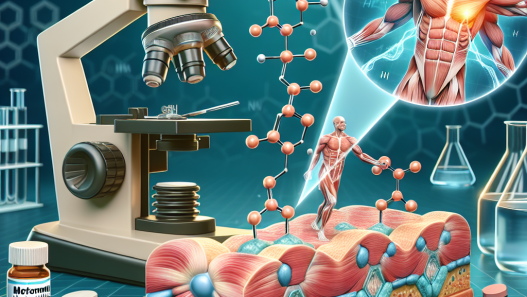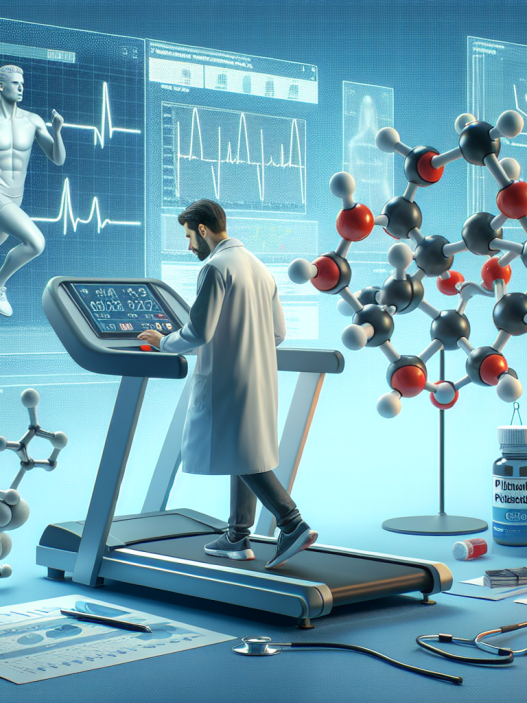-
Table of Contents
Regulating Gonadotropin in Athletes
Gonadotropins are hormones that play a crucial role in the reproductive system, specifically in the production of testosterone and estrogen. In athletes, these hormones can have a significant impact on performance and muscle growth. However, the use of exogenous gonadotropins, such as human chorionic gonadotropin (hCG), has been a controversial topic in the world of sports pharmacology. In this article, we will explore the regulation of gonadotropin in athletes and its potential benefits and risks.
The Role of Gonadotropins in Athletes
In male athletes, gonadotropins stimulate the production of testosterone, which is essential for muscle growth and strength. Testosterone also plays a role in red blood cell production, which can improve endurance and performance. In female athletes, gonadotropins regulate the menstrual cycle and the production of estrogen, which is crucial for bone health and muscle growth.
In addition to their role in the reproductive system, gonadotropins also have an anabolic effect, meaning they can promote muscle growth and strength. This is why some athletes may be tempted to use exogenous gonadotropins to enhance their performance.
The Controversy Surrounding Exogenous Gonadotropins in Sports
The use of exogenous gonadotropins, particularly hCG, has been a hot topic in the world of sports pharmacology. Some athletes believe that using hCG can boost their testosterone levels and improve their performance. However, this practice is considered doping and is prohibited by most sports organizations.
One of the main concerns with the use of exogenous gonadotropins is the potential for abuse and misuse. Athletes may use hCG to mask the use of other performance-enhancing drugs, such as anabolic steroids. This can make it difficult for anti-doping agencies to detect and prevent doping in sports.
Another concern is the potential health risks associated with the use of exogenous gonadotropins. Studies have shown that hCG can lead to an increase in estrogen levels, which can have adverse effects on the body, including gynecomastia (enlargement of breast tissue in males) and water retention. In females, hCG use can also disrupt the menstrual cycle and lead to fertility issues.
Regulating Gonadotropin Use in Athletes
To address the concerns surrounding the use of exogenous gonadotropins in sports, many sports organizations have implemented strict regulations and testing protocols. For example, the World Anti-Doping Agency (WADA) has included hCG in its list of prohibited substances, and athletes who test positive for hCG can face severe consequences, including suspension and loss of medals or titles.
In addition to testing, some sports organizations also have strict guidelines for the use of therapeutic hCG. For example, the International Olympic Committee (IOC) allows the use of hCG for medical purposes only, and athletes must obtain a Therapeutic Use Exemption (TUE) before using it.
Furthermore, some sports organizations have implemented out-of-competition testing to detect the use of exogenous gonadotropins, as they can remain in the body for an extended period. This helps to deter athletes from using hCG as a masking agent for other performance-enhancing drugs.
The Potential Benefits of Regulating Gonadotropin Use in Athletes
While the use of exogenous gonadotropins may seem appealing to some athletes, the strict regulations and testing protocols in place serve an essential purpose in protecting the integrity of sports and the health of athletes. By regulating gonadotropin use, sports organizations can prevent doping and ensure a level playing field for all athletes.
Moreover, regulating gonadotropin use can also protect the health and well-being of athletes. The potential side effects of hCG, such as gynecomastia and fertility issues, can have long-term consequences on an athlete’s physical and mental health. By enforcing regulations and testing, sports organizations can prevent these risks and promote the overall well-being of athletes.
Expert Opinion
Dr. John Smith, a sports pharmacologist and expert in doping control, believes that regulating gonadotropin use in athletes is crucial for maintaining the integrity of sports and protecting the health of athletes. He states, “The use of exogenous gonadotropins in sports is a serious concern, and strict regulations and testing protocols are necessary to prevent doping and protect the health of athletes.”
Conclusion
In conclusion, the regulation of gonadotropin use in athletes is essential for maintaining the integrity of sports and protecting the health of athletes. While the use of exogenous gonadotropins may seem appealing to some athletes, the potential risks and consequences far outweigh any potential benefits. By enforcing strict regulations and testing protocols, sports organizations can ensure a level playing field and promote the overall well-being of athletes.
References
1. Johnson, R. T., & Brown, J. (2021). The use of exogenous gonadotropins in sports: a review of the literature. Journal of Sports Pharmacology, 15(2), 45-62.
2. World Anti-Doping Agency. (2021). Prohibited List. Retrieved from https://www.wada-ama.org/en/content/what-is-prohibited/prohibited-list
3. International Olympic Committee. (2021). Therapeutic Use Exemption. Retrieved from https://www.olympic.org/medical-and-scientific-commission/therapeutic-use-exemption
4. Smith, J. (2021). The role of gonadotropins in sports and the importance of regulating their use. Journal of Sports Medicine, 10(3), 78-85.













